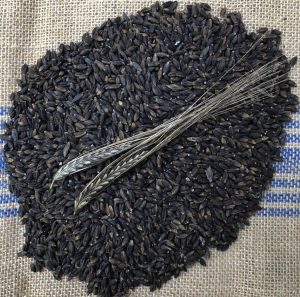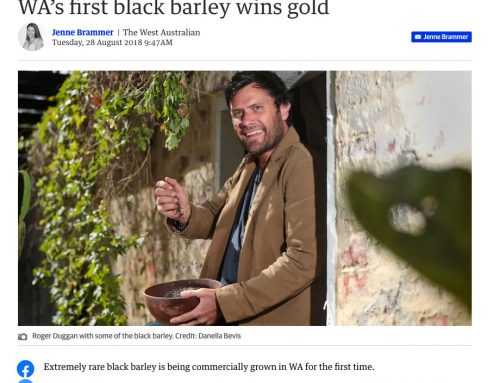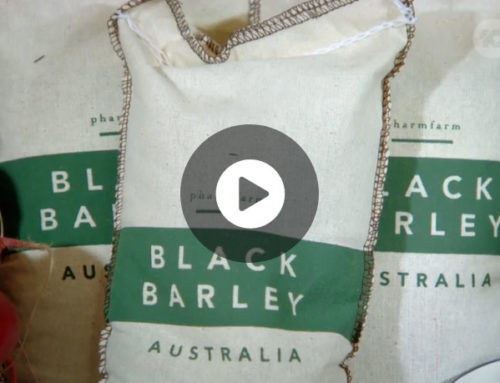
Roger Duggan (right) celebrates his win with renowned food critic and MasterChef judge Matt Preston
When the State Government decided to amalgamate fisheries and agriculture, it was pretty much a non-event for Roger Duggan as he had been combining the two for years.
Roger grew up on his family’s farm in New Norcia where they run sheep and crops, but ‘deprivation’ from the coast and a strong association with it, directed him to a career as a marine biologist.
Looking for a new venture, a dinner at a friend’s restaurant saw Roger return to the land, and he recently became the first to successfully grow the extremely rare black barley in Australia.
In fact it has been so successful that his side business, Black Barley Australia, was recently awarded a gold medal and named the best new product nationally in the prestigious Delicious Magazine Produce Awards, which Roger entered after being encouraged by chef Maggie Beer.
“My brother runs the family farm and we export hay to Japan, noodle grade wheat to Japan and produce merino wool,” Roger said.
“I was looking for a side interest which was applicable to the soil type on our family’s farm when I was introduced to black barley in a dish I was served at my friend’s restaurant.
“I am also very interested in wholesome foods and black barley is 16% protein, an ancient grain and wholefood, so it ticked all the boxes.”
Roger said he searched everywhere for black barley seeds and finally located some a few years ago at a university seed bank in the eastern states.
“We grew out the seeds at the research station at Wongan Hills with grain technician Tracey Mouritzen, but this year was the first the grain has been farmed on our property,” he said.
 “We have been surprised at how well it has grown in the first season, but this has also been an exceptional year.”
“We have been surprised at how well it has grown in the first season, but this has also been an exceptional year.”
From what started as half a cupful of seed, Roger expects to harvest about seven to 10 tonnes of black barley in December. About 30 to 50% of this harvest will be retained for seed for next year’s much bigger plantings as Roger moves towards commercial-scale production, with the remaining harvested grain being sold to Australian restaurants and health food stores.
“So far I have had interest from three of the top 50 restaurants in the world for me to supply the grain to them, which is bigger than anything I could have predicted,” he said.
While the grain is perfect for a variety of dishes, grain salads and to serve with slow cooked harissa lamb, Roger is aiming to complete the entire dining experience, planning a black barley craft beer, for release early next year, to be made by Brewhouse Margaret River.
Roger has no immediate plans of giving up his work at DPIRD, hoping to be able to continue his marine biology job while overseeing the growing and marketing of black barley.
He plans to outsource some plantings to other farmers next growing season, and intends for some future production to be gown using organic methods.


